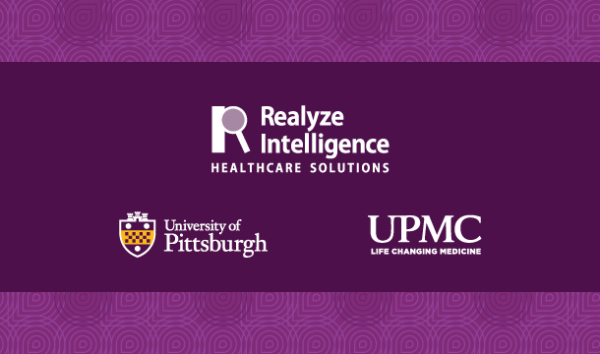PITTSBURGH, July 17, 2024 – Leveraging the advanced capabilities of Realyze Intelligence technology, researchers from the University of Pittsburgh and UPMC Hillman Cancer Center have developed a novel prompt, or ‘nudge’ embedded within the electronic health record. This nudge is designed to alert surgeons to older patients with early-stage breast cancer who may be at risk of unnecessary surgery, thereby reducing over-treatment.
Adrian Lee, Ph.D, Director of the Institute for Precision Medicine & a senior author on the study shared,
“Analysis enabled by Realyze Intelligence allowed us to learn about how patients are treated and develop concepts towards our goal of personalizing therapy. In a data-driven approach, we expect to reach our goal of improving breast cancer outcomes.”
Published today in JAMA Surgery, the study revealed that the implementation of this nudge nearly halved the rate of sentinel lymph node biopsy (SLNB) among eligible patients. This suggests that a simple, timely reminder can significantly reduce over-treatment in older breast cancer patients.
The study is a continuation to a previous study in JCO Clinical Cancer Informatics, published in May, demonstrating that Realyze Intelligence technology is well equipped for enhanced data capture from the electronic health record given its examination of both content-driven and context-driven extraction approach. Realyze Intelligence AI models are clinically validated – see prior work presented at American Association for Cancer Research 2024.
Read the JAMA Surgery article HERE
“In breast cancer, there is a growing movement toward precisely treating each individual patient, what we call right-sized care,” said senior author Priscilla McAuliffe, M.D., Ph.D., associate professor of surgery at Pitt and breast surgical oncologist at UPMC Hillman and UPMC Magee-Womens Hospital. “SLNB helps us determine if breast cancer has spread to the underarm lymph nodes, but it’s not necessary for every patient. We developed a simple, user-friendly nudge that provides a timely reminder to surgeons to consider the value of SLNB for each patient.”
The American Board of Internal Medicine’s Choosing Wisely recommendations, endorsed by the Society of Surgical Oncology, advises against routine SLNB for patients aged 70 and older with early-stage estrogen-receptor positive breast cancer due to the low risk of metastasis and favorable tumor biology. Despite this, many women in this demographic still undergo the procedure, which does not provide beneficial treatment information, lacks survival benefits, and can lead to side effects.
“Patients who undergo SLNB are at risk of developing a serious complication called lymphedema, a permanent but treatable swelling of the arm or breast that can greatly impact quality of life,” said first author Neil Carleton, Ph.D., a student in Pitt’s Medical Scientist Training Program. “As patients get older, they also have more challenges recovering from surgery and a higher risk of complications from anesthesia, so if a patient isn’t likely to benefit from SLNB, we want to avoid it whenever possible.”
The team developed and evaluated a nudge in the electronic health record that reminds surgeons to consider the value of SLNB in patients who are flagged as potentially eligible to forgo the surgery based on their age and tumor biology.
In a non-randomized clinical trial, involving seven surgeons across eight surgical oncology clinics within the Magee-Womens Breast Cancer Program and UPMC Hillman, the nudge was tested. The surgeons performed SLNB in 46.9% of eligible patients before the nudge and in only 23.8% of eligible patients during the intervention, marking a 49.3% reduction. The rate further decreased to 15.6% in an additional 6-month follow-up period.
Utilizing Realyze Intelligence’s validated & clinically contextualized AI pipeline, the researchers also analyzed patient records for lymphedema symptoms. The referral rate for lymphedema evaluations dropped from 6.2% to 3.6% following the nudge’s implementation.
The team aims to extend the nudge to more UPMC network physicians, with the goal of enhancing patient care system-wide :
“Because this nudge is integrated into the electronic health record, it’s easily accessible across the health system,” said McAuliffe. “Patients in community settings are often excluded from clinical trials, but in this study, they were as consistently involved as patients seen at the main site.”
Clinicians & clinical research teams at UPMC Hillman Cancer Center are using the AI-driven prowess of Realyze Intelligence to efficiently align patients with suitable clinical trials.
This research study one of many ways this team is improving individualized care for breast cancer patients & underscores to utility of AI in healthcare — transforming clinical data into actionable insights and ultimately improving patient care.

MULTIDISCIPLINARY TEAM ACKNOWLEDGEMENT
Read the JAMA Surgery article.
Priscilla McAuliffe, M.D., Ph.D., associate professor of surgery at University of Pittsburgh School of Medicine and breast surgical oncologist at UPMC Hillman and UPMC Magee-Womens Hospital [Magee-Womens Research Institute & Foundation], Neil Carleton Ph.D., a student in Pitt’s Medical Scientist Training Program and their multidisciplinary team, including Adrian Lee Ph.D. of the Institute for Precision Medicine, Thomas R. Radomski, M.D., M.S. and Gary Fisher, M.D. of the Division of General Internal Medicine at Pitt, developed and evaluated the electronic health record nudge that reminds surgeons to consider the value of SLNB in patients who are flagged as potentially eligible to forgo the surgery based on their age and tumor biology.
Realyze Intelligence co-founder & Chief Medical Officer Gilan El Saadawi, MD, PhD was a co-author on the study.
Several health & oncology news outlets are also reporting on this story. Read more from :
The ASCO Post – Electronic Health Record–Based Prompt May Help Reduce Breast Cancer Overtreatment
MedPage Today – EHR ‘Nudge’ Cut Low-Value Surgery Rates in Older Breast Cancer Patients
Tech Explorist – E-Prompts reduce breast cancer overtreatment
UPMC News – Electronic Prompt for Surgeons May Reduce Breast Cancer Overtreatment
